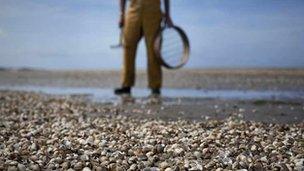Cockle deaths in Burry Inlet not caused by pollution, study finds
- Published

Cockles in the Burry Inlet began dying prematurely in 2002
A three-year investigation into cockle deaths off Gower in south-west Wales concluded pollution was not to blame.
The study, led by Hull University, blames parasites, overcrowding and conditioning of cockles after spawning.
The Welsh government launched the inquiry after a series of mortalities in the Burry Inlet which have damaged the shellfish industry since 2002.
Environment Agency Wales says a management plan will be drawn up to limit the problem in future.
Chris Mills, director of the agency, said: "This report is another step in the effort to re-establish the Burry Inlet cockle fishery as a sustainable and viable industry for the people who fish here - but at the same time protect cockles for the important bird life in this special area of conservation."
Environment minister John Griffiths said it was an emotive issue and it was "positive" that there was no evidence to link water quality to the cockle deaths.
"The Welsh government will now consider the findings of the report in full and will work closely with Environment Agency Wales and local communities to ensure the ongoing and sustainable management of the cockle beds," he said.
Investigation
An interim study had previously found no evidence to link the cockle deaths with pollution.
But Haydn Hughes, chairman of the Burry Inlet Hand Gatherers' Association, is not convinced by the report.
He said: "We've known for a few months now that with this report it's inconclusive."
He added that water quality was a "big issue" and he called for an investigation into what went into the water.
"From what I can gather at the moment, the water authority are hoping to spend £600m to rectify the problems which are being put into the estuary at the moment."
- Published11 June 2010